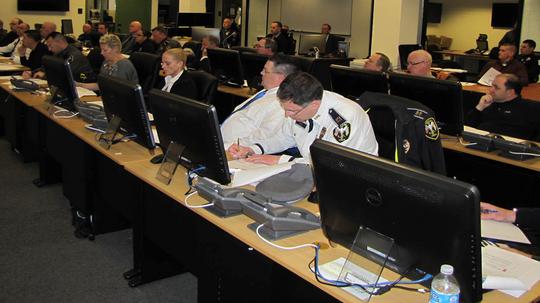
Editor's Note: Across the Inno network, we're taking a look at those entities who are taking big risks to achieve the (seemingly) impossible. In Rhode Island, we're specifically looking at the different ways tech and other organizations handle natural disasters and protect the state from Mother Nature's worst moods — a big task, to be sure. Some may say they’re aiming for the moon with these huge ideas. But since when does any innovator worth their salt think small? To check out moonshots in all 13 Inno markets, click here.
When a man-made or natural disaster strikes, a lot of chaos can ensue — throwing people into uncertainty and leaving the state tasked with steering the community toward safety.
For Tom Guthlein, executive administrator of the Rhode Island Emergency Management Agency, once his team has first and foremost ensured the safety of the state’s residents and property, the goal is to get back to normalcy as quickly as possible.
And one of the key ways to do this is to get the business community back up and running.
“It’s a partnership, so we are trying to work with the businesses so we know what information they need so we can get it to them,” said Guthlein, adding that 80 percent of the state’s critical infrastructure is privately owned. “We want to get it back to the point where if people need water, they can go buy water from a store instead of us having to stockpile it [and distribute].”
State And Business Community Working Together
That’s why the state and business community have been taking steps in recent years to better coordinate how they prepare (and act) should a disaster, like a storm or an active shooter situation, take place.
Five years ago, the state completely overhauled its State Emergency Operations Center.
Now, one of the stations in the SEOC is manned by an employee from the Rhode Island Commerce Corporation, a quasi-public agency, so the entire business community essentially has a seat at the SEOC.
“We normally start by sending out a lot of information and do a conference call with important businesses, telling them where impacted areas are so they are aware that this is what we are predicting,” said Guthlein. “We keep them in the loop as we monitor the situation.”
When the SEOC was overhauled, it added lots of tech to help it carry out its responsibilities.
“Businesses don’t know what they don’t know yet, but when we get together like this, people start to ask important questions. Resiliency [preparation] could be a game changer.”
It now uses GIS mapping tools and a Florida-based company called CodeRed. Said company allows government agencies to easily deliver geo-targeted, time-sensitive information to any individual opting into the service through voice, email, SMS and more.
Better communication in real-time with the business community has paid off for the state on several occasions, according to Guthlein.
During one recent snowstorm, the governor had closed the roads to let the snow plowers clear them off. However, the Stop & Shop in North Kingston had just lost power in one of its generators, and was worried they would lose a lot of inventory.
Stop & Shop called the SEOC to let them know about the situation, and to also let them know they might be able to save the food if they brought in freezer trucks right away.
The state ended up giving an exemption to Stop & Shop during the road closures and even provided escort vehicles for the freezer trucks, which got there in time to save the food.
Other technology the SEOC uses includes a platform called WebEOC, a web-based crisis management system that provides real-time information sharing and resource request tracking.
This, according to Guthlein, allows cities and towns to communicate what they need directly to the SEOC. For instance, if a town was out of sandbags and needed more, they would be able to directly message the SEOC. Then, the agency could arrange the appropriate delivery.
RIEMA is also working with is a program called Cease. Under this initiative, RIEMA would hand out ID cards with a little chip in them that could be given to key business leaders.
If an area a business is located in is impacted by a disaster, the specific leader of that business would be able to show up at the scene, show a Cease card to police and be admitted. The cards would also help RIEMA track when people come in and out of important areas.
Businesses Working Hand In Hand
Even with businesses working more closely alongside the state, the fact remains that leadership in government agencies and elected officials is frequently changing.
To make sure there is continuity, some of the largest companies in the state have come together to form the Rhode Island Alliance for Business Resiliency.
The goal of the public-private venture is to create a unified voice within the public sector for continuity and disaster recovery on behalf of the business community. Additionally, it's looking to build new capabilities and relationships to establish a community response to disaster relief.
Founding members include Citizens Bank, Raytheon, General Dynamics, CVS, Fidelity Investments and Amica Insurance. The alliance also works with chamber of commerces and trade groups to make sure they are reaching smaller companies as well.
“How do we get through a disaster scenario and recover and also how do we communicate information to employees and work with state are all questions we are looking at,” said Stuart Freiman, who heads the alliance, which he said is still in early stages. “It’s also important to have a relationship with the state, because the state has information and the ability to provide knowledge and support decision making in an emergency.”
Additionally, while the state has its own disaster preparation plan, many of the larger companies in Rhode Island have their own disaster plans and operations centers as well.
Citizens Bank can’t afford to have its system down for more than a minute, according to Freiman, and CVS has to be able to be able to get drugs and prescriptions out to people who need them, even in disaster situations.
One thing the alliance has been great for is bringing these key personnel together who are charged with overseeing disaster preparation at these bigger companies, and allowing them to network.
“This breaks down the barrier and allows the different companies to share tips and exchange best practices,” said Freiman. “Key people at Raytheon and Citizens now know each other. The companies are coming together and saying, ‘When a storm hits, we are all in this together.’”
The alliance has also brought in experts to help businesses learn about and discuss other disasters such as cybersecurity issues and active shooter situations.
“Businesses don’t know what they don’t know yet, but when we get together like this, people start to ask important questions,” said Freiman. “Resiliency [preparation] could be a game changer.”








